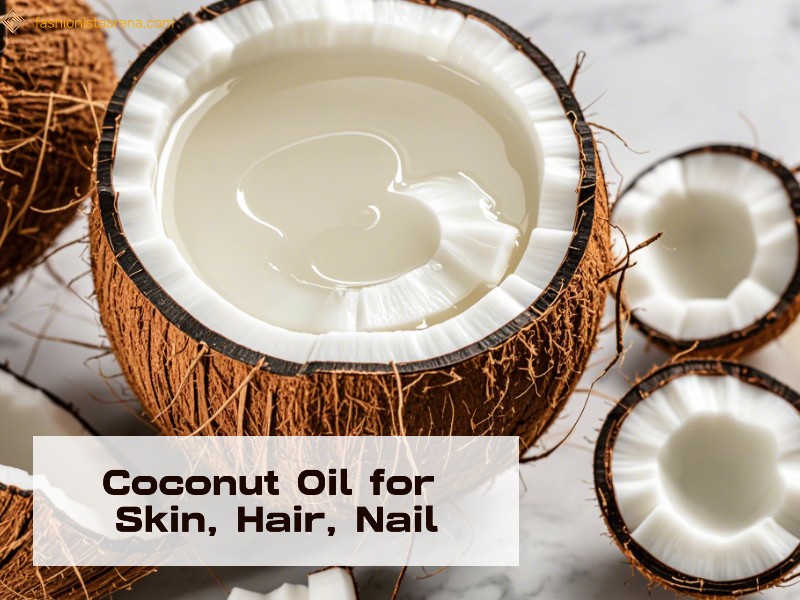Natural coconut oil contains essential fatty acids, vitamins, and antioxidants. Due to its high properties, coconut oil is beneficial for various purposes like skincare, haircare, nail care cooking, etc. This content will provide the key features of coconut oil and top benefits for skin, hair, and nails. By discovering the key benefits of organic coconut oil, you will be able to use it more effectively.
What is Natural Coconut Oil?
Coconut oil is natural oil. This is made from the meat of coconut. The history of pure coconut oil is rich and long, especially in tropical regions where coconut trees grow abundantly. For thousands of years, people from Southeast Asia, India, the Pacific Islands, and Africa have used natural coconut oil in medicine, cooking, diet, and daily life. You can use it in its pure form (virgin coconut oil) or as refined coconut oil, depending on your needs.
Discover Almond oil for skin, hair, and nails!
Types of Organic Coconut Oil
Coconut oil has 2 main types;
1. Virgin Coconut Oil (VCO)
Virgin coconut oil is made from fresh coconut. A wet process produces this type of oil to maintain its natural coconut flavor and smell. It has nutrients and antioxidants. These vital properties of Virgin coconut oil make it excellent for your hair, skin, and cooking.
2. Refined Coconut Oil (RCO)
Refined Coconut oil is produced from dry coconut to remove impurities. It is used in cooking due to its mild taste at high temperatures and also in beauty products to make them effective for beauty.
Key Ingredients
There are key ingredients in organic coconut oil. Due to its powerful ingredients and benefits, this oil is used worldwide. Let’s dive into its key elements deeply;
Fatty Acids
-
- Lauric Acid: The most abundant fatty acid in coconut oil, making up about 40-50%. It also possesses antibacterial, antifungal, and antiviral properties.
- Caprylic Acid: Known for its antifungal and antimicrobial effects.
- Capric Acid: A medium-chain fatty acid known for its antifungal benefit
- Myristic Acid: It improves the absorption of the oil by the skin and hair.
- Palmitic Acid: A moisturizing fatty acid that helps protect the skin.
- Stearic Acid: Known for its cleansing and moisturizing properties.
- Oleic Acid: A monounsaturated fat that is beneficial for hydration.
- Linoleic Acid: An essential omega-6 fatty acid that helps with skin barrier function and moisture retention.
Vitamins
Essential coconut oil has vitamin E, an oxidant that helps protect cells from free radical damage, promotes skin healing, and supports hair and nail health.
Polyphenols
These compounds in coconut oil contribute to the anti-inflammatory and anti-aging benefits of coconut oil and act as antioxidants.
Phytosterols
These are the plant-based elements that reduce inflammation and support the skin’s natural moisture barrier.
Minerals
Coconut oil has a small amount of minerals like zinc and iron which are vital for the overall health of skin and hair.
Top Benefits of Natural Coconut Oil
As I have already told you, coconut oil is rich in medium-chain fatty acids (MCFAs), particularly lauric acid, which is known for its anti-bacterial, anti-inflammatory, and deeply moisturizing properties. Now it is time to consider key benefits for skin, hair, and nails.
Coconut Oil for Skin
➥Moisturizer for Dry Skin
Due to its deeply moisturizing properties, it becomes a natural moisturizer for skin, particularly for dry and sensitive skin. It deeply hydrates dry and rough skin. When applied, coconut oil locks moisture in the skin and maintains its hydration.
Try also a honey and sweet almond oil mask to moisturize the skin!
How to use it?
- After taking a shower, apply a thin layer of natural coconut oil to your skin and dampen it slightly.
- Always I will say, please test on small areas to check allergic reactions. Gently massage for the best results.
➥Soothes Skin Irritations
If your skin is generally irritated or has skin conditions like eczema or psoriasis, coconut oil can help to solve this issue. Its inflammatory properties help to calm down red and swollen areas. Its lauric acid helps to fight bacteria which cause infection on the skin.
How to use it?
- Put a small amount of coconut oil on directly dry and irritated areas once or twice a day.
- If you have acne-prone skin, use it carefully and sparingly to avoid blocking your pores
➥Natural Makeup Remover
Oh, wow! Coconut oil works as a makeup remover, yes! Its fatty acids help to break and make, even waterproof kinds making it easier to wipe them away, hydrating the skin and helping to prevent dryness. Unlike other makeup removers, it won’t take away your skin’s natural oils.
How to use it?
➥Anti-Aging Benefits
As coconut oil has a good amount of antioxidants especially vitamin E, which fight infection n or damage that causes the skin to age. Using it regularly can effectively help you to reduce the appearance of wrinkles on your skin and keep your skin youthful. Make sure to adopt a proper skincare routine.
How to use it?
- Take a little amount of coconut oil in your hand fingers and dab it under your eyes.
- If you have wrinkles in other areas, you can use it, always recommended to use it before bed.
Otherwise, if you have oily skin, try 7 natural remedies!
Coconut Oil for Hair
➥Deep Conditioning Treatment
Because this oil has moisturizing properties, it can become a natural conditioner for hair. This oil nourishes and moisturizes your hair effectively. It’s true that coconut oil can be heavier than other oils. if your hair suffers from low porosity, you can use it! Discover Why? Also, know about 3 best oil for low-porosity hair.
How to use it?
- Warm up a small amount of coconut oil and apply it to your scalp and hair, especially focusing on the ends.
- For a deeper treatment, leave it on for at least 30 minutes or overnight.
- Wash it out with a mild shampoo to avoid buildup.
➥Frizz Control and Shine
If your hair tends to be frizzy, coconut oil can become an excellent solution for this. Its nourishing qualities help shield your hair from frizz and dryness. Otherwise, you should always consult with your professional about your hair problem.
How to use it?
- Take a tiny amount of coconut oil in both hands and rub the oil between your hands.
- Apply it to your hair lightly smoothing it over your hair to control frizz and add shine.
➥Scalp Health
Coconut oil is also advantageous for scalp health and can help with dandruff or low-porosity hair. This ability in coconut oil is almost due to antibacterial and antifungal properties. It moisturizes and hydrates the scalp, helping to reduce dryness and flakes.
How to use it?
➥Hair Growth
Many people believe that coconut oil is best for hair growth. I think consulting with professionals about hair is a good idea as they advise properly and accordingly. This reduces breakage and strengthens hair roots, though more research is needed.
How to use it?
- Use coconut oil regularly and massage it on every part of the hair.
- Always apply it to the ends of your hair to help reduce split ends.
Coconut Oil for Nailcare
➥Cuticle Moisturizer
Coconut oil not only nourishes skin and hair but also nails cuticles and is ideal for nail care. It is also ideal for keeping nails and cuticles healthy and moisturized. It also prevents painful hangnails and keeps your nails looking nice and glossy.
How to use it?
- Take a small amount of oil and gently massage it on yo nails’ cuticles.
- For better results and to keep cuticles moisturized, use every day or when needed.
➥Nail Strengthener
the moisturizing effect also helps to strengthen weak or brittle nails and makes them less likely to break or peel. During my depth research, I have found it better also for nail fungus. also, discover other 8 effective oils for ctticles to make natural nails.
How to use it?
- After trimming your nails or removing nail polish, take a small amount of coconut oil.
- Rub it into your nails, and use it regularly to make strong and healthy nails.
➥Natural Nail Polish Remover
Coconut oil is for not only removing makeup but also removing nail polish on your cuticles. For this purpose, you need to mix lemon juice with coconut oil to make it a gentle remover and prevent harsh chemical effects.
How to use it?
- Mix the equuual parts of the coconut oil and lemon juice in a bowl.
- Soak your nails in the mixture of coconut oil and lemon juice on the cotton pad to swipe out nail polish.
Are There Any Downsides?
Coconut oil is usually safe for most people to use, but if you have oily or acne-prone skin, it might clog your pores and lead to breakouts. To avoid any issues, it’s wise to try a small amount on a small patch of skin first, especially if your skin is sensitive.
When it comes to hair, using too much coconut oil can make it feel greasy and weighed down. It’s best to start with a small amount and see how your hair reacts, then adjust the amount you use based on your hair’s needs.
- Can I Use Natural Coconut Oil for Skin, Hair, & Nails? - September 12, 2024
- Honey & Sweet Almond Oil for Face-Simple Recipe and Benefits - September 11, 2024
- Is Almond Oil Good for Skin, Hair, Nail & What’s Potential Benefits? - September 11, 2024


